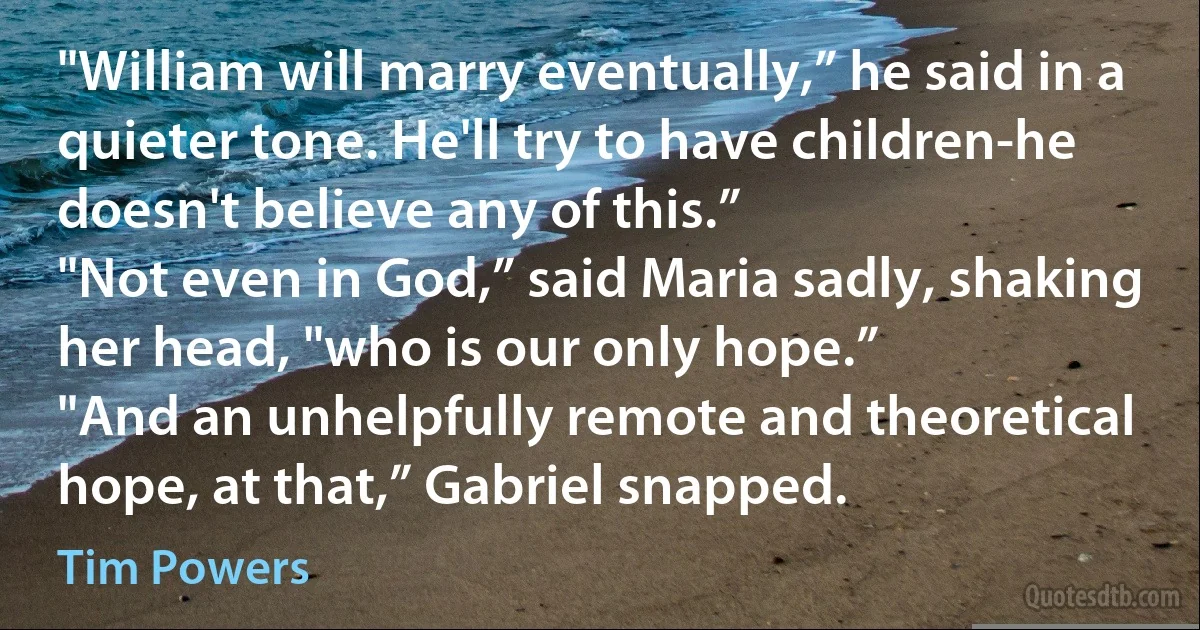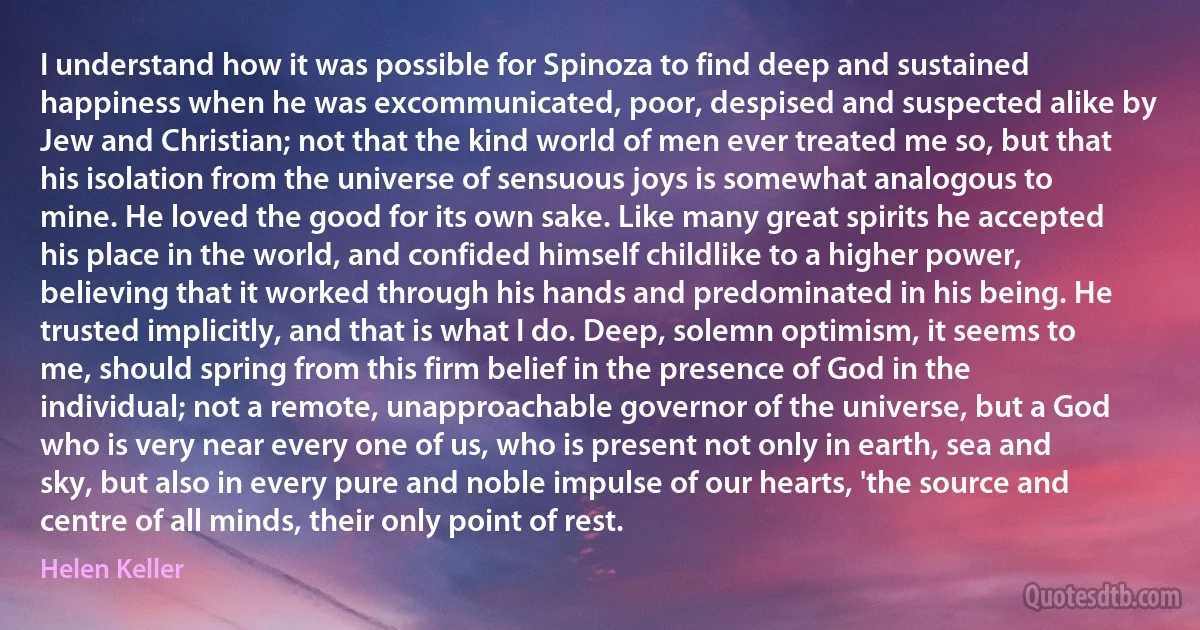Remote Quotes - page 6
In their brief primitive phase, the Fifth Men, like so many other races, sought to console themselves by unreasoning faith in a life after death, They conceived, for instance, that at death terrestrial beings embarked upon a career continuous with earthly life, but far more ample, either in some remote planetary system, or in some wholly distinct orb of space-time. But though such theories were never disproved in the primitive era, they gradually began to seem not merely improbable but ignoble.

Olaf Stapledon
If ever they are put to the test, they shy away, affirming that nationalism is 'practical', cosmopolitanism but a remote ideal. Though they see it intellectually, their hearts are not capable of responding to it. If ever the nation is in danger, their cosmopolitanism evaporates, and they stand for the nation in the good old style. Yet intellectually they know that in their modem world this way leads to disaster.

Olaf Stapledon
Throughout their early stages the movements of civilization-for, properly speaking, there was no one movement-were very slow, were local in space, and were partial in the sense that each developed along but few lines. Of the numberless years that covered these early stages we have no record. They were the years that saw such extraordinary discoveries and inventions as fire, and the wheel, and the bow, and the domestication of animals. So local were these inventions that at the present day there yet linger savage tribes, still fixed in the half-bestial life of an infinitely remote past, who know none of them except fire-and the discovery and use of fire may have marked, not the beginning of civilization, but the beginning of the savagery which separated man from brute.

Theodore Roosevelt
A work upon the plan originally contemplated by the Author seems still to be required, to initiate the young and uninstructed in the study of those MEDALS 0F CREATION-those electrotypes of nature-the mineralized remains of the plants and animals which successively flourished in the earlier ages of our planet, in periods incalculably remote, and long antecedent to all human history and tradition. With this conviction the present volumes are offered... as a guide for the Student and the Amateur Collector of fossil remains; for the intelligent Observer who may desire to possess a general knowledge of the subject, without intending to pursue Geology as a science; and for the Tourist who may wish, in the course of his travels, to employ profitably a leisure hour in quest of those interesting memorials of the ancient physical revolutions of our globe, which he will find everywhere presented to his observation.

Gideon Mantell
Meanwhile these islands, stiff with cold and frost, and in a distant region of the world, remote from the visible sun, received the beams of light, that is, the holy precepts of Christ, the true Sun, showing to the whole world his splendour, not only from the temporal firmament, but from the height of heaven, which surpasses every thing temporal, at the latter part, as we know, of the reign of Tiberius Caesar, by whom his religion was propagated without impediment, and death threatened to those who interfered with its professors.

Gildas
Direct and unconcealed brute force and violence-although clearly persisting in many quarters of society-are today less acceptable to an increasingly sophisticated public, a public significantly remote from the methods of social and economic control common to early America. This is not a statement, however, that there is such increased civility that Americans can no longer tolerate social control of the country's under classes by force of violence; rather, it is an observation that Americans today appear to be more inclined to issue endorsement to agents and agencies of control which carry out the task, while permitting the benefactors of such control to retain a semidignified, clean-hands image of themselves.

Huey P. Newton
-What did you do today?
-Went to the grocery store and Xeroxed a box of English muffins, two pounds of ground veal and an apple. In flagrant violation of the Copyright Act.
-You had your nap, I remember that-
-I had my nap.
-Lunch, I remember that, there was lunch, slept with Susie after lunch, then your nap, woke up, right?, went Xeroxing, right?, read a book not a whole book but part of a book-
-Talked to Happy on the telephone saw the seven o'clock news did not wash dishes want to clean up some of this mess?
-If one does nothing but listen to the new music, everything else drifts, frays. Did Odysseus feel this way when he and Diomedes decided to steal Athene's statue from the Trojans, so that they would become dejected and lose the war? I don't think so, but who is to know what effect the new music of that remote time had on its hearers?
-Or how it compares to the new music of this time?
-One can only conjecture.

Donald Barthelme
Around late 1961 to 1962, right around there, somewhat unevenly and sort of spottily, I began to do pieces that were based upon a short text of actions that only involved a handful of friends or students at some specific site - a site that was not marked as an art site, a ravine somewhere, or a roadway, or somebody's apartment, or the telephone, that is, the places of everyday life, not designated as sites of art. And the work itself, the action, the kind of participation, was as remote from anything artistic as the site was.. ..I chose the word Happening from its normal language usage somewhat earlier for that philosophical reason, but I didn't categorize that as lifelike until much later. But in fact, looking back, that's exactly what Happening meant.

Allan Kaprow
My photographs are facts which bring the right accessibility to remote, lonely or otherwise unrecognizable works. Some sculptures are seen by few people, but can be known about by many. My outdoor sculptures and walking locations are not subject to possession and ownership. I like the fact that roads and mountains are common, public land. My outdoor sculptures are places. The material and the idea are of the place; sculpture and place are one and the same. The place is as far as the eye can see from the sculpture. The place for the sculpture is found by walking.

Richard Long
To Leonardo a landscape, like a human being, was part of a vast machine, to be understood part by part and, if possible, in the whole. Rocks were not simply decorative silhouettes. They were part of the earth's bones, with an anatomy of their own, caused by some remote seismic upheaval. Clouds were not random curls of the brush, drawn by some celestial artist, but were the congregation of tiny drops formed from the evaporation of the sea, and soon would pour back their rain into the rivers.

Kenneth Clark
In a theory in which parameters are added to quantum mechanics to determine the results of individual measurements, without changing the statistical predictions, there must be a mechanism whereby the setting of one measuring device can influence the reading of another instrument, however remote. Moreover, the signal involved must propagate instantaneously, so that such a theory could not be Lorentz invariant. Of course, the situation is different if the quantum mechanical predictions are of limited validity. Conceivably they might apply only to experiments in which the settings of the instruments are made sufficiently in advance to allow them to reach some mutual rapport by exchange of signals with velocity less than or equal to that of light. In that connection, experiments of the type proposed by Bohm and Aharonov, in which the settings are changed during the flight of the particles, are crucial.

John Stewart Bell
If the whole of natural theology, as some people seem to maintain, resolves itself into one simple, though somewhat ambiguous, at least undefined proposition, that the cause or causes of order in the universe probably bear some remote analogy to human intelligence: If this proposition be not capable of extension, variation, or more particular explication: If it affords no inference that affects human life, or can be the source of any action or forbearance: And if the analogy, imperfect as it is, can be carried no farther than to the human intelligence, and cannot be transferred, with any appearance of probability, to the other qualities of the mind; if this really be the case, what can the most inquisitive, contemplative, and religious man do more than give a plain, philosophical assent to the proposition, as often as it occurs, and believe that the arguments on which it is established exceed the objections which lie against it?

David Hume
The more remote and unreal the personal mother is, the more deeply will the son's yearning for her clutch at his soul, awakening that primordial and eternal image of the mother for whose sake everything that embraces, protects, nourishes, and helps assumes maternal form, from the Alma Mater of the university to the personification of cities, countries, sciences and ideals.

Carl Jung



